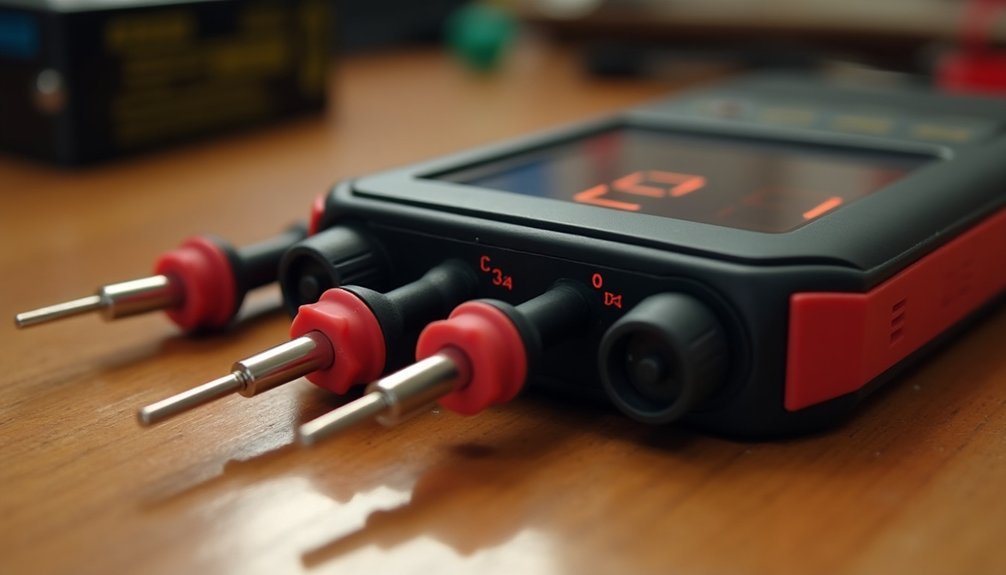You'll find that choosing the right battery voltage checker can make or break your testing accuracy, whether you're a professional technician or a DIY enthusiast. From basic alkaline testers to sophisticated automotive diagnostic tools, today's market offers numerous options that can leave you wondering which one truly deserves your investment. Let's explore the top 6 battery voltage checkers that'll serve you reliably throughout 2025 and beyond.
Dlyfull LCD Universal Battery Tester & Checker
The Dlyfull LCD Universal Battery Tester & Checker is a versatile companion for anyone managing multiple battery types, from standard AA and AAA to specialty batteries like CR2032 and CRV3.
You'll appreciate its user-friendly design, featuring a clear LCD screen that instantly shows if your batteries are in poor, weak, or good condition. The compact, lightweight build includes an anti-slip finish for secure handling.
While it won't accurately test rechargeable batteries or perform load tests, it's backed by an 18-month warranty and responsive customer service. The device comes with an AAA battery, so you can start testing right away and avoid wasting money on unnecessary battery replacements.
Best For: Home users and small business owners who need to quickly check various battery types and want to avoid unnecessarily replacing or recharging batteries.
Pros:
- Compatible with a wide range of battery types including AA, AAA, C, D, 9V, and various button cell batteries
- Clear LCD display provides instant battery health status readings (poor, weak, or good)
- Compact, portable design with anti-slip finish and includes starter battery
Cons:
- Not suitable for testing rechargeable batteries
- Lacks load testing capability for more thorough battery assessment
- Functions more as a basic voltmeter rather than a comprehensive battery tester
Dlyfull LCD Battery Tester for Multiple Battery Types
Battery enthusiasts and eco-conscious consumers will appreciate the Dlyfull LCD Battery Tester's versatility in checking multiple battery types, from standard AA and AAA to specialized cells like CR2032 and CRV3.
You'll find the clear LCD display instantly shows if your batteries are good, weak, or poor, helping you avoid unnecessary recharges. The pocket-sized design features an anti-slip finish for secure handling, and you won't need any technical expertise to use it.
This reliable tester comes in four colors and includes an AAA battery to get you started. Just remember to remove the battery during extended storage to prevent leakage.
Best For: Home users and tech enthusiasts who need to quickly test multiple battery types and want to avoid unnecessarily discarding batteries that still have life left in them.
Pros:
- Compatible with a wide range of battery types including AA, AAA, C, D, 9V, and various button cells
- Clear LCD display provides easy-to-read results showing battery condition
- Compact and portable design with anti-slip finish for comfortable handling
Cons:
- Requires an AAA battery for operation which needs to be removed during storage
- Housing may chip or break if dropped
- Price variations across different sellers may make it difficult to find the best deal
ANCEL BA101 Car Battery Tester 12V for Automotive Diagnostics
Mechanics and DIY car enthusiasts will appreciate ANCEL BA101's extensive diagnostic capabilities for 12V automotive batteries. You'll get accurate results testing battery health, voltage, and charging systems across flooded, AGM, GEL, and EFB batteries within 100-2000 CCA range.
The device's 99.6% accuracy comes from its quality copper clips and smart chip technology. You'll find the large LCD screen with adjustable contrast easy to read, while built-in safety features protect against reverse polarity and short circuits. Just remember you'll need a USB connection for power, and you must input the correct AH or CCA values from your battery label for reliable diagnostics.
Best For: Professional mechanics and DIY auto enthusiasts who need accurate diagnostics for 12V automotive batteries and want a reliable, feature-rich testing tool.
Pros:
- High accuracy (99.6%) with advanced copper clips and intelligent chip technology
- Compatible with multiple battery types (flooded, AGM, GEL, EFB) and supports 100-2000 CCA range
- Comprehensive safety features including reverse polarity and short circuit protection
Cons:
- Requires USB power connection to operate (not battery-powered)
- Menu system can be complex for beginners to navigate
- No carrying case included and instructions could be clearer for non-English speakers
Dlyfull Universal Battery Tester for Multiple Battery Types
For budget-conscious homeowners seeking a versatile battery tester, Dlyfull's Universal Battery Tester offers straightforward functionality across multiple battery types. You'll easily test 1.5V AAA, AA, C, D alkaline batteries, 9V batteries, and button cells with this lightweight 70g device.
The B1L model displays health status through a simple color-coded system: green for good, yellow for low, and red for replacement. While it doesn't require a power supply and comes with an 18-month warranty, you'll need to hold batteries steady during testing. Despite minor build quality concerns, you'll find it's an effective tool for quick household battery checks.
Best For: Budget-conscious homeowners and casual users who need a simple, portable device to test various common household batteries.
Pros:
- Compatible with multiple battery types including AAA, AA, C, D, 9V, and button cells
- Lightweight and portable design at just 70g
- Easy-to-understand color-coded results system (green/yellow/red)
Cons:
- No holding mechanism to secure batteries during testing
- Some users report concerns about build quality
- Basic functionality without advanced features or detailed readings
Battery Tester Checker BT-168 for Multiple Battery Types
The versatile BT-168 stands out as an essential tool for anyone managing multiple battery types in their household or workplace. You'll appreciate its self-powered operation and ability to test AA, AAA, C, D, 9V, and 1.5V button cell batteries.
The analog display provides instant feedback with a three-color system: green for good, yellow for low, and red for replacement. While it's lightweight and portable, you might find button batteries tricky to position during testing. Despite its basic plastic construction, users report significant cost savings by identifying usable batteries they might have otherwise discarded.
Best For: Home users and tech enthusiasts who regularly use multiple types of batteries and want a simple, cost-effective way to check battery life.
Pros:
- Self-powered operation eliminates need for separate power source
- Clear three-color display makes battery status instantly readable
- Universal compatibility with most common battery types (AA, AAA, C, D, 9V, button cells)
Cons:
- Lightweight plastic construction may raise durability concerns
- Button batteries can be difficult to position and test properly
- Provides only basic voltage testing, not detailed capacity measurement
Dlyfull LCD Universal Battery Tester for Multiple Battery Types
Battery enthusiasts seeking versatility will find their match in the Dlyfull LCD Universal Battery Tester. This compact device checks a vast range of batteries, from standard AA and AAA to specialized types like CR2032 and CRV3.
You'll appreciate the clear LCD screen that instantly shows if your batteries are in poor, weak, or good condition. It's ready to use right away with the included AAA battery. While it won't accurately test rechargeable batteries or perform load tests, you'll get reliable voltage readings for disposable batteries. With an 18-month warranty and anti-slip design, you're getting a practical tool that'll help you manage your battery inventory effectively.
Best For: Home users and hobbyists who need a simple, reliable way to test multiple types of disposable batteries and want to avoid unnecessarily throwing away good batteries.
Pros:
- Compatible with a wide variety of battery types including AA, AAA, C, D, 9V, and various button cells
- Clear LCD display provides immediate battery status readings (poor/weak/good)
- Compact, portable design with anti-slip finish and comes ready to use with included battery
Cons:
- Not suitable for testing rechargeable batteries
- Lacks load testing capability for more thorough battery health assessment
- Functions more as a basic voltmeter rather than a comprehensive battery tester
Factors to Consider When Choosing Battery Voltage Checkers
When you're in the market for a battery voltage checker, you'll want to evaluate several key features that determine its overall effectiveness and usefulness. Consider compatibility with your specific battery types, clear display readability, and how easily you can carry and store the device. The tester's accuracy, response time, and construction quality will also impact your long-term satisfaction with the purchase.
Battery Type Compatibility
Since different batteries power various devices in your home, choosing a voltage checker with broad compatibility is essential. You'll want to guarantee your tester can handle common household batteries like AA, AAA, C, D, and 9V, along with button cell varieties.
Look for a checker that's versatile enough to test both standard alkaline and specialized batteries, including lithium and rechargeable types. If you're working with automotive or marine applications, you'll need a tester that's compatible with AGM, GEL, and flooded batteries. The best voltage checkers provide clear readings about battery health, helping you quickly identify whether batteries are good, weak, or need replacement. By selecting a tester that accommodates multiple battery sizes and technologies, you'll avoid the expense and inconvenience of purchasing separate devices for different battery types.
Display and Reading Clarity
After finding a voltage checker that works with your batteries, you'll want to guarantee its display provides clear, easy-to-read measurements. Look for devices with crisp LCD screens that remain visible in various lighting conditions. You'll benefit from models featuring color-coded indicators that instantly signal battery status – green for good, yellow for low, and red for replacement.
Consider the screen size, especially if you work in dim environments or have vision challenges. Models with adjustable contrast and backlighting offer better visibility across different settings. You'll also want a display that presents information in straightforward terms without complex technical jargon. This makes it easier to interpret results quickly and accurately, whether you're a professional technician or a casual user.
Size and Portability Features
The ideal battery voltage checker combines compact design with practical functionality, making it easy to carry and store. You'll want to look for lightweight models that can fit comfortably in your pocket or bag without adding unnecessary bulk to your tool collection.
Consider testers with anti-slip finishes, as they'll provide better grip and prevent accidental drops during regular use. It's also beneficial to choose models that come with built-in batteries, so you can start testing immediately without additional purchases. When evaluating size, make sure the tester can still accommodate various battery types and sizes – you don't want to sacrifice versatility for compactness. The best portable checkers strike a balance between user-friendly operation and thorough testing capabilities, ensuring you won't struggle with complex handling while on the go.
Testing Speed and Accuracy
When selecting a battery voltage checker, testing speed and accuracy should be your top priorities. You'll want a tester that delivers instant results while maintaining precision, ideally with accuracy rates up to 99.6%. This combination helps you avoid unnecessary charging cycles and make quick decisions about battery replacement.
Look for devices that provide clear, easy-to-understand health status indicators. The best testers will immediately show if your battery is good, weak, or poor, eliminating guesswork from your assessment. You'll also benefit from choosing a tester that's compatible with multiple battery types, as this versatility guarantees reliable readings across different applications. While maintaining the speed and accuracy you need, don't forget that a compact, lightweight design will help you complete your testing tasks more efficiently.
Build Quality and Durability
Investing in a battery voltage checker with robust build quality pays dividends in the long run. You'll want to look for models featuring high-quality materials that can withstand frequent use and accidental drops. A durable casing serves as your first line of defense against impact damage while protecting the sensitive internal components.
Consider testers with an anti-slip finish, as they'll provide better grip and control during testing procedures. While lightweight models offer greater portability, don't compromise on sturdiness – find a balance that suits your needs. To maximize your checker's lifespan, remember to perform basic maintenance like removing batteries when not in use to prevent corrosion. By choosing a well-built voltage checker and maintaining it properly, you'll guarantee reliable performance throughout its service life.
Frequently Asked Questions
Can Battery Voltage Checkers Detect Faulty Wiring in Devices?
Yes, you can use voltage checkers to detect faulty wiring by measuring voltage drops and continuity across connections. They'll help you spot loose connections, shorts, and breaks in your device's electrical system.
How Often Should Batteries Be Tested to Maintain Optimal Performance?
You should test your batteries every 3-4 months for consumer electronics and monthly for critical devices. If you're using rechargeable batteries, check them after every 10 charging cycles to guarantee peak performance.
Do Voltage Checkers Work Accurately in Extreme Temperatures?
You'll find that voltage checkers' accuracy can be affected by extreme temperatures. Most devices work best between 32-104°F (0-40°C). For reliable readings, you should test batteries in room temperature conditions.
Can Battery Testers Predict Remaining Battery Life With Precision?
You can't get perfectly precise battery life predictions from testers. While they'll give you estimated lifespan based on current voltage and internal resistance, factors like temperature, usage patterns, and battery chemistry affect accuracy.
Are Battery Voltage Checkers Safe to Use on Wet Batteries?
You shouldn't test wet batteries without proper safety gear. While voltage checkers are generally safe, always wear gloves and eye protection when testing wet batteries to protect yourself from acid splashes and harmful fumes.
In Summary
You'll find a voltage checker that fits your needs among these six top-rated options. Consider your specific requirements, from basic household battery testing to professional automotive diagnostics. Don't forget to weigh important factors like display type, battery compatibility, and durability when making your choice. With proper research and the right device, you'll accurately test batteries and guarantee peak performance in all your equipment.

As educators and advocates for responsible drone use, we’re committed to sharing our knowledge and expertise with aspiring aerial photographers.




Leave a Reply